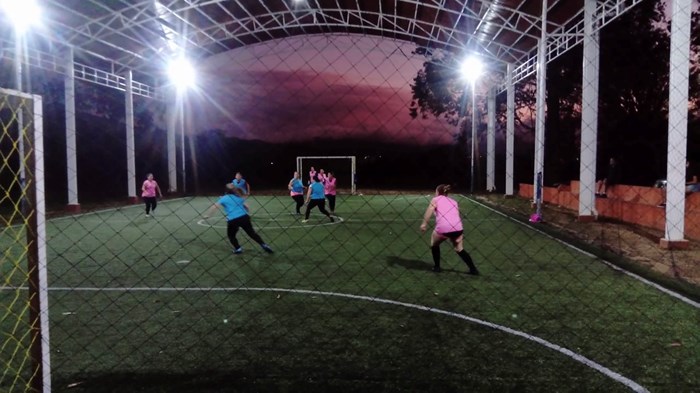The Salvation Army Is Trying New Methods of Local Sustainability

As the plane began its descent over the scenes of destruction in Port-au-Prince, it was hard to believe that it had already been a year since the devastating earthquake that had killed more than 200,000 people. The piles of rubble, blocked streets, and collapsed or teetering buildings made it look as though the tragedy had happened only a couple months before. It was February of 2011 and I was moving to Haiti to assist The Salvation Army with their ongoing disaster recovery efforts in the country.
I wasn’t the only one. Legions of organizations, specialists and teams poured into the country to help in whatever way they could. It was a wonderful outpouring of support represented in an alphabet soup of acronyms plastered in decals on the sides of tinted-windows, tote bags and tarps. We all carried our own version of the Hippocratic oath, knowing that even within the best of intentions there are still myriad ways in which helping can cause more hurt than relief. We committed to not create power dynamics that could lead to donor-driven agendas or institutionalized dependency. We knew to avoid creating permanent dependencies with those we served, by how we served them. Rather than bestowing piece-meal charity that required cyclical petitions, we did our best to empower beneficiaries in ways that encouraged dignity, capacity, and hope.
But in our focus on the empowerment of beneficiaries, those who have truly suffered from a disaster or chronic deprivations, how often did we also check to make sure we weren’t still using a toxic-charity delivery model in the way we supported our implementing partners on the frontlines? Were we also empowering Haitians to respond to the needs within their own country, or were we comfortable with just awaiting their next request?
Put bluntly, as all those organizations began to leave Haiti in the years after, how many told their partners “we promise to come back whenever the next disaster strikes,” and how many said, “now you’re equipped to better handle future crises on your own?”
It’s been ten years since Haiti and I once again work internationally for The Salvation Army. Throughout 131 countries, local Army leaders preach the Gospel of Jesus Christ and meet human needs in His name without discrimination, serving the most vulnerable in areas of health, education, livelihoods, advocacy, and often most prominently, in disaster response. For several decades, Salvation Army commands in the US and Europe have financially supported the work of their sister commands in the developing world. As these transfers became institutionalized, they could often create unintended, unhealthy aspects of control and dependency.
That is why in 2016, our international leader announced the goal of helping all Salvation Army commands to become self-sustainable within the next 15 years. Support and the sharing of resources in the time of crisis or strategic expansion is still guaranteed, but the daily operations of a command’s local mission should not depend on the largesse or approval of another one 8,000 miles away.
My job now is to help build the capacity of commands to develop their own sources of local income generation so that they can better respond autonomously to daily needs and future emergencies. Using entrepreneurship and small business methodologies, we work together to identify strategic combinations of available assets and community needs, evaluate and test the biggest assumptions, and develop operational plans to create new social enterprises and fundraising efforts. And then we partner with them to fund and scale their initiatives.
This is a new direction for a 156-year-old ministry. It requires a willingness to change mindsets and accept calculated failures as we learn along the way. Our first priority is learning, through strategic experimentation and rapid iteration, and the process can lead to a variety of ideas.
Sometimes it’s building a soccer field in Guatemala that is used by Salvation Army after-school programs during the week and rented out for profit on the weekends. Other times, it’s clear that it’s best to establish a local fundraising office. Every now and then the revealed opportunity is totally unexpected, like setting up a printing press in Nigeria that does commercial work during the day, and outreach materials in the evenings. All of these generate income for the local command so that they can rapidly respond with relevance to their community’s needs.
There will always be disasters in this world and those who have an abundance of resources must be ready to serve and support our sisters and brothers who are carrying out the mission in vulnerable areas. But they shouldn’t have to wait for anyone else to arrive before the work can start. If supporters or responders don’t also commit to the patient, humble, longer investment of helping their partners develop their own resources, then we are leaving the door open for our own return as heroes. Hopefully, we all moved away from a toxic-charity delivery model for our beneficiaries a long time ago. Now, we should ensure we’re truly empowering our partners in the same way.
Damon Winters serves The Salvation Army as their Technical Advisor for International Business and Economic Development. He works around the world in fundraising, institutional sustainability and income generation, and teaching entrepreneurship. He holds degrees from Wheaton College (BA ’09) and The University of Chicago (MA ’13).
The Better Samaritan is a part of CT's
Blog Forum. Support the work of CT.
Subscribe and get one year free.
The views of the blogger do not necessarily reflect those of Christianity Today.



















